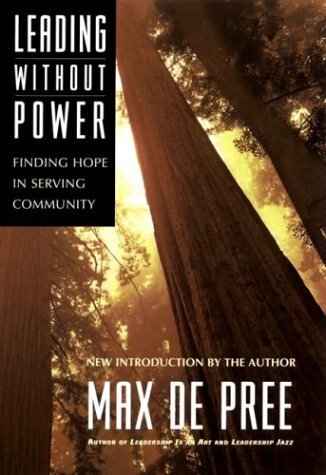Max De Pree, Leading Without Power: Finding Hope in Serving People. Jossey-Bass, 2003.
Referenced in: Empowering Leadership
LifeandLeadership.com Summary
De Pree is one of the most widely referenced authors on transformational, empowering and servant leadership philosophies. In my opinion, this is De Pree’s best book as it relates to congregational leadership. He applies the principles from Leadership Jazz and Leadership Is An Art to non-profit organizations that depend upon volunteer workers.
De Pree believes non-profits are more easily what all organizations, even for-profits, should be – “places of realized potential.” They are churches, hospitals, charitable organizations, and schools consisting of people who fulfill callings, not simply do jobs. This book is an uplifting visionary description of what such organizations are and what they can become with good leadership.
The list of eight characteristics of “places of realized potential” in the first chapter is inspiring enough in itself. He then discusses how such places can actually become movements, where a collective consciousness exists that the future can be created, not simply experienced or endured. The third chapter suggests the current context for such service is under serious transition with schools and families at risk, less assimilation among diverse groups, workplaces battling for limited resources, more temporization in the workforce, and increased ambiguity in values. The path toward potential depends at least partially on defining what should be measured so that participants know what to expect from their work and from each other. In chapter four, De Pree presents a refreshing list of benchmarks, including “unmeasurables” such as the behavior of leaders and relational qualities such as equity, good order, civility, good manners, sensitivity, and forgiveness. He advises that leaders who seek to communicate such potential must remember that most of their communication is unconscious or unintentional, more in behavior than words. He provides a great starter list of words that convey potential. He devotes an entire chapter to families – the “soil in which competence, productive relationships, and a commitment to service take root.” Another chapter discusses fourteen attributes of vital organizations. The closing chapters offer seasoned insight on vision, trust, risk, hope, and moral purpose.
Typical of De Pree’s writings, Leadership Without Power can be read in one sitting. Any leader will be inspired, challenged, and educated by his words.
From the Publisher
Simple yet profound, Max De Pree’s observations are often quoted by America’s top CEOs, educators, and opinion makers. The best-selling author of Leadership Is an Art and Leadership Jazz, he has done no less than revolutionize leadership thinking and practice. Now, in Leading Without Power, De Pree finds that the most successful organizations of the Information Age operate not as controlled collections of human resources, but as dynamic communities of free people. And in order to mobilize these communities, leaders must know how to lead without power, because free people follow willingly or not at all.
About the Author
MAX DE PREE is chairman emeritus of Herman Miller, Inc., the primary innovator in the furniture business for sixty years and regularly included as one of Fortune’s 25 Most Admired Companies in the United States. The author of the bestselling Leadership Jazz, as well as Leading Without Power, Called to Serve, and Dear Zoe, De Pree has been mentoring emerging leaders in both the profit and non-profit sectors for more than twenty years, and was elected by Fortune magazine to the National Business Hall of Fame.
***For additional information on this resource, including reviews, click the bookstore links. Check the reference at page top or the links below for resource guides on related topics.***
Related Areas
See Other Resources on Leadership:
See Resources on Over 100 Areas of Ministry Leadership:


